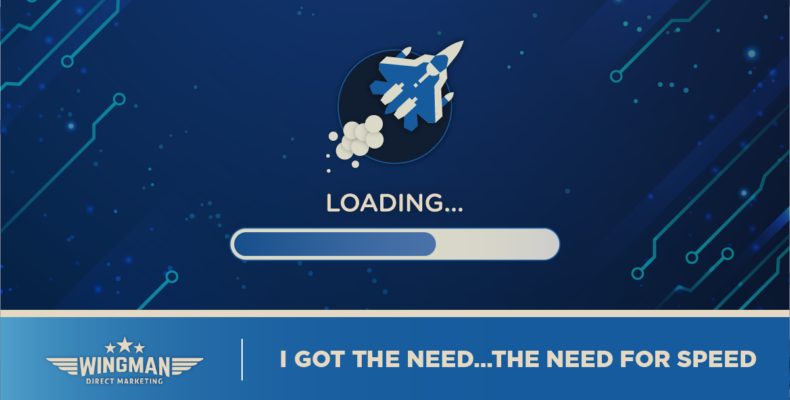Did you know that the uber-80’s movie Top Gun came out exactly 35 years ago today??!!
Your business website – like Tom Cruise – also has a need for speed: Load speed. While design, theme, user navigation, and relevant content are all critical elements of a good website, one thing many DIY designers and developers tend to overlook is load speed.
Why Website Load Speed Matters
Apart from the fact that consumers today are probably the most impatient generation of all time, you have to understand that nobody – of any generation – likes a website that’s slow. Nevertheless, here are a few important reasons why website speed matters:
You only get one chance to make a first impression
Today more than ever, your target audience and ultimate buyer is online. In fact 85% of consumers conduct some degree of online research before making a purchase. This means that they are accessing information online on their desktops, laptops, tablets or smartphones. Your digital customer is also quite impatient. When a user visits your website for the first time, you can be sure that they will make a judgment about you, your website quality and your business – and will do this in a handful of seconds. Don’t mess this up with slow load speed. The end-user won’t stay long and almost certainly will not return. If you want to make sure you don’t lose a healthy percentage of your target market because your website takes forever to load, make sure you focus on your website’s load speed.
Always on the go
Not only are they not likely to offer second chances if your website load speed drags beyond their attention span but they will not have any compassion for your website not being optimized for the device they are using at that moment. Even if they have everything on the tips of your fingers, they are still always busy, always moving and always impatient. When it comes to the Internet and websites, they expect speed. And if they don’t’ get it, they won’t bother with it.
You are serving two Masters
Like most digital marketing strategies, the human end user is not the only stakeholder in this equation. In fact, likely more important than consumers with limited attention span is the search engine algorithms. Google and Microsoft both include load speed as one variable in their search rank algorithms. So, if you want your website to rank high in end-users search results, it’s crucial that you step up your game and make sure your website load speed is maximized. Your business’ goal is to enhance the user experience because you want those users to keep coming back.
Conversion, conversion, conversion
If your website speed is less than optimum, your conversion rates are likely to be the same. According to a Financial Times report, declining page duration starts to drop after only a single second with increasing levels of abandonment every second. Web users will starkly drop off after 5 seconds moving on to the next search result. What does this mean? This means a slow website will drive customers away. This defeats the entire purpose and convenience of having a website in the first place. Do a speed check and make sure you don’t lose a large percentage of your audience just because you didn’t focus on speed.
What Your Page Speed Should Be
Your website page speed needs to be as fast as you can make it while meeting the needs of your audience. That’s simple enough and yet also very difficult. When it comes to page speed, there are many factors to your success: the browser, device, web hosting provider, and content on the page, which is why you need to focus on your visitor’s needs.
Speed Check Your Website
Uptrends has a simple to use Speed Test tool so you can check to find out where you stand and if your website takes too long to load. You need to know your load speed on different devices, different browsers, and different geographical locations. For example, if your website has a global audience, make sure you test the website speed for all major regions.
What can you do about it?
This blog isn’t going to serve as a step-b-step guide on what to do because each business and each website is quite unique. However, most improvements for your website load speed fall into one of three categories:
- Too many or conflicting redirects – the more themes, widgets or plug-ins used on your Site, the more lag on load speed.
- Too much website bandwidth size – if your images and plug-ins have not been optimized for the web, they needlessly slow down the download speed for the user.
- Server Performance – hosting servers and their programming impact your website before visitors even gets to your website.
Ready to start soaring to new speeds? You don’t have to fly solo.
If you want your website to be “heading into twilight spreading out your wings tonight. Jumping off the deck and shoving into overdrive,” [Danger Zone – Kenny Loggins] you need speed. If your website load speed is slow – or even if it is simply slower than your competitor(s) – your digital consumer will find another website that offers them a similar solution. Don’t lose your customers for something as identifiably easy to fix as your website load speed.
But, as demonstrated above, there are many factors that add up to the eventual page speed and even more factors as to why it is so important for your business. There are many tools out there to assist you in dealing with all of the potential fixes manually, but it can truly prove to be an unbearable chore. If you want a Wingman to watch your back, we’re only one contact away. You don’t have to fly solo. Book a Wingman today.

